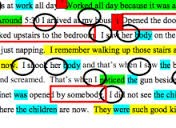Forensic Statement Analysis (FSA) is a methodical process that involves critical examination of the verbal data in written or spoken statements; as answers to questions during interviews, depositions, testimony; and, from other types of documents (affidavits, reports, letters, emails, etc.).
FSA seeks to determine if the information the person has provided is credible; or, if there are areas that indicate missing information; are internally contradictive; or, are related to possible deception. FSA is not handwriting analysis or graphology.
 ID-Lies uses manual and computer-based FSA. An analyst examines the statement, interview, etc., applying a set of FSA Criteria. This process involves not “reading” the statement as literature, but closely examining and comparing each partial word, word, phrase, clause, and sentence of verbal data to FSA Criteria. Depending on the length of the document, the FSA process may take several hours. The analysis yields a color coded copy of the statement in which pertinent areas of verbal data are highlighted.
ID-Lies uses manual and computer-based FSA. An analyst examines the statement, interview, etc., applying a set of FSA Criteria. This process involves not “reading” the statement as literature, but closely examining and comparing each partial word, word, phrase, clause, and sentence of verbal data to FSA Criteria. Depending on the length of the document, the FSA process may take several hours. The analysis yields a color coded copy of the statement in which pertinent areas of verbal data are highlighted.
ID-Lies uses FSA protocols and a software program developed by Dr. Donald I. Bender, a Licensed Clinician and Professor of Psycholinguistics at the University of California, Berkeley. Dr. Bender is a primary consultant with ID-Lies.
FSA can be used by attorneys, business owners, private investigators, insurance investigators, parole and probation officers, police officers and detectives, psychologists, psychiatrists, marriage counselors, and anyone who must evaluate the credibility of information obtained from persons.
USES OF FSA FOR ATTORNEYS
- Verify the credibility of information provided by clients, deponents, witnesses, and other persons involved in criminal, civil, accident, and other cases.
- Verify the credibility of information in depositions, testimony, affidavits, applications for court-issued documents (Peace Orders, Restraining Orders, etc.), applications for statement of charges, applications for search and seizure warrants.
- Insure all written statements in your case are truthful.
- Find missing information and deception (if it exists) in written statements.
- Ascertain additional investigative needs from information in written statements.
- Make sure there are no surprises in court.
- Determine areas in which to ask more detailed questions of persons during depositions and testimony.
USES OF FSA FOR BUSINESSES
Analyses of employee’s statements and interviews in regard to:
- Thefts of cash, merchandise, property
- Disclosure of propriety information
- Destruction of company property
- Involvement in accidents using company vehicles
- Other work place accidents
- Workplace disputes
- Sexual harassment allegations
- As a basis for establishing reasonable suspicion for polygraph testing under the EPPA law
- Statements provided by job applicants
USES OF FSA FOR PERSONS IN THE COMMUNITY
Analyses of the verbal information in letters, emails, text messages.
We can conduct FSA on the following documents:
- Hand written statements
- Typed statements.
- Computer generated statements.
- Transcribed interviews, depositions, testimony. (Transcriptions must be verbatim, and include all partial words and interjection noises such as “ah, er, uh,” etc.)
- Affidavits of arrest and search and seizure warrants.
- Letters
- Email communications
- Text messages
- Reports
- Translated documents from primary language into English.
 Please call us at 240-401-5762 to discuss if FSA is applicable to the documents you wish to have examined.
Please call us at 240-401-5762 to discuss if FSA is applicable to the documents you wish to have examined.
Hand written statements and recorded interviews, depositions, and testimony are the best sources for a valid FSA analysis. Other documents, such as typed and computer generated statements, affidavits, emails, and reports may have been altered, and may not be a good source for FSA.
Certain documents, which are illegible, illiterate, or too short may not be valid for analysis. If the document is written in a non-English language, we can have it transcribed into English for analysis.
Please see this current research link for further information on FSA: Distinguishing Truthful From Deceptive Eyewitness Accounts of Highly Stressful Events
